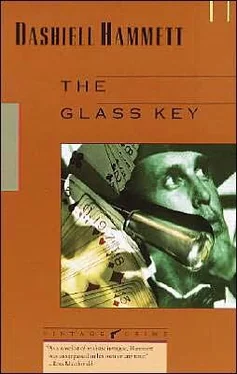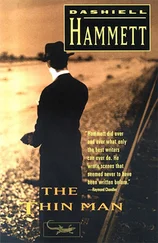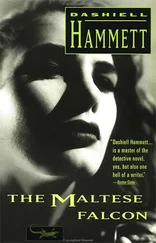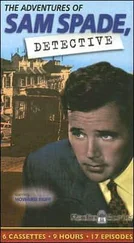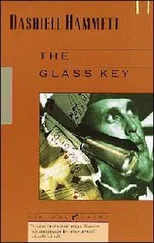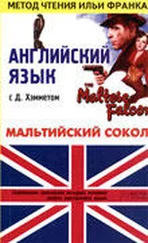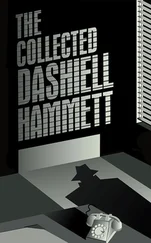Then he said into the telephone: "Hello. Is Mr. Farr in? Ned Beaumont. . . . Yes, thanks." He inhaled and exhaled smoke slowly. "Hello, Farr? Just got in a couple of minutes ago. . . . Yes. Can I see you now? . . . That's right. Has Paul said anything to you about the West killing? . . . Don't know where he is, do you? . . . Well, there's an angle I'd like to talk to you about. . . . Yes, say half an hour. . . Right."
He put the telephone aside and went across the room to look at the mail on a table by the door. There were some magazines and nine letters. He looked rapidly at the envelopes, dropped them on the table again without having opened any, and went into his bedroom to undress, then into his bathroom to shave and bathe.
2
District Attorney Michael Joseph Farr was a stout man of forty. His hair was a florid stubble above a florid pugnacious face. His walnut desk-top was empty except for a telephone and a large desk-set of green onyx whereon a nude metal figure holding aloft an airplane stood on one foot between two black and white fountain-pens that slanted off to either side at rakish angles.
He shook Ned Beaumont's hand in both of his and pressed him down into a leather-covered chair before returning to his own seat. He rocked back in his chair and asked: "Have a nice trip?" Inquisitiveness gleamed through the friendliness in his eyes.
"It was all right," Ned Beaumont replied. "About this Francis West: with him out of the way how does the case against Tim Ivans stand?'
Farr started, then made that startled motion part of a deliberate squirming into a more comfortable position in his chair.
"Well, it won't make such a lot of difference there," he said, "that is, not a whole lot, since there's still the other brother to testify against Ivans." He very noticeably did not watch Ned Beaumont's face, but looked at a corner of the walnut desk. "Why? What'd you have on your mind?"
Ned Beaumont was looking gravely at the man who was not looking at him. "I was just wondering. I suppose it's all right, though, if the other brother can and will identify Tim."
Farr, still not looking up, said: "Sure." He rocked his chair back and forth gently, an inch or two each way half a dozen times. His fleshy cheeks moved in little ripples where they covered his jaw-muscles. He cleared his throat and stood up. He looked at Ned Beaumont now with friendly eyes. "Wait a minute," he said. "I've got to go see about something. They forget everything if I don't keep right on their tails. Don't go. I want to talk to you about Despain."
Ned Beaumont murmured, "Don't hurry," as the District Attorney left the office, and sat and smoked placidly all the fifteen minutes he was gone.
Farr returned frowning. "Sorry to leave you like that," he said as he sat down, "but we're fairly smothered under work. If it keeps up like this—" He completed the sentence by making a gesture of hopelessness with his hands.
"That's all right. Anything new on the Taylor Henry killing?"
"Nothing here. That's what I wanted to ask you about—Despain." Again Farr was definitely not watching Ned Beaumont's face.
A thin mocking smile that the other man could not see twitched for an instant the corners of Ned Beaumont's mouth. He said: "There's not much of a case against him when you come to look at it closely."
Farr nodded slowly at the corner of his desk. "Maybe, but his blowing town that same night don't look so damned good."
"He had another reason for that," Ned Beaumont said, "a pretty good one." The shadowy smile came and went.
Farr nodded again in the manner of one willing to be convinced. "You don't think there's a chance that he really killed him?"
Ned Beaumont's reply was given carelessly: "I don't think he did it, but there's always a chance and you've got plenty to hold him awhile on if you want to."
The District Attorney raised his head and looked at Ned Beaumont. He smiled with a mixture of diffidence and good-fellowship and said: "Tell me to go to hell if it's none of my business, but why in the name of God did Paul send you to New York after Bernie Despain?"
Ned Beaumont withheld his reply for a thoughtful moment. Then he moved his shoulders a little and said: "He didn't send me. He let me go.
Farr did not say anything.
Ned Beaumont filled his lungs with cigar-smoke, emptied them, and said: "Bernie welshed on a bet with me. That's why he took the run-out. It just happened that Taylor Henry was killed the night of the day Peggy O'Toole came in in front with fifteen hundred of my dollars on her."
The District Attorney said hastily: "That's all right, Ned. It's none of my business what you and Paul do. I'm—you see, it's just that I'm not so damned sure that maybe Despain didn't happen to run into young Henry on the street by luck and take a crack at him. I think maybe I'll hold him awhile to be safe." His blunt undershot mouth curved in a smile that was somewhat ingratiating. "Don't think I'm pushing my snoot into Paul's affairs, or yours, but—" His florid face was turgid and shiny. He suddenly bent over and yanked a desk-drawer open. Paper rattled under his fingers. His hand came out of the drawer and went across the desk towards Ned Beaumont. In his hand was a small white envelope with a slit edge. "Here." His voice was thick. "Look at this and see what you think of it, or is it only damned foolishness?"
Ned Beaumont took the envelope, but did not immediately look at it. He kept his eyes, now cold and bright, focused on the District Attorney's red face.
Farr's face became a darker red under the other man's stare and he raised a beefy hand in a placatory gesture. His voice was placatory: "I don't attach any importance to it, Ned, but—I mean we always get a lot of junk like that on every case that comes up and—well, read it and see."
After another considerable moment Ned Beaumont shifted his gaze from Farr to the envelope. The address was typewritten:
M. J. Farr, Esq.
District Attorney
City Hall
City
Personal
The postmark was dated the previous Saturday. Inside was a single sheet of white paper on which three sentences with neither salutation nor signature were typewritten:
Why did Paul Madvig steal one of Taylor Henry's hats after he was murdered?
What became of the hat that Taylor Henry was wearing when he was murdered?
Why was the man who claimed to have first found Taylor Henry's body made a member of your staff?
Ned Beaumont folded this communication, returned it to its envelope, dropped it down on the desk, and brushed his mustache with a thumb-nail from center to left and from center to right, looking at the District Attorney with level eyes, addressing him in a level tone: "Well?"
Farr's cheeks rippled again where they covered his jaw-muscles. He frowned over pleading eyes. "For God's sake, Ned," he said earnestly, "don't think I'm taking that seriously. We get bales of that kind of crap every time anything happens. I only wanted to show it to you."
Ned Beaumont said: "That's all right as long as you keep on feeling that way about it." He was still level of eye and voice. "Have you said anything to Paul about it?"
"About the letter? No. I haven't seen him since it came this morning."
Ned Beaumont picked the envelope up from the desk and put it in his inner coat-pocket. The District Attorney, watching the letter go into the pocket, seemed uncomfortable, but he did not say anything.
Ned Beaumont said, when he had stowed the letter away and had brought a thin dappled cigar out of another pocket: "I don't think I'd say anything to him about it if I were you. He's got enough on his mind."
Farr was saying, "Sure, whatever you say, Ned," before Ned Beaumont had finished his speech.
After that neither of them said anything for a while during which Farr resumed his staring at the desk-corner and Ned Beaumont stared thoughtfully at Farr. This period of silence was ended by a soft buzzing that came from under the District Attorney's desk.
Читать дальше
